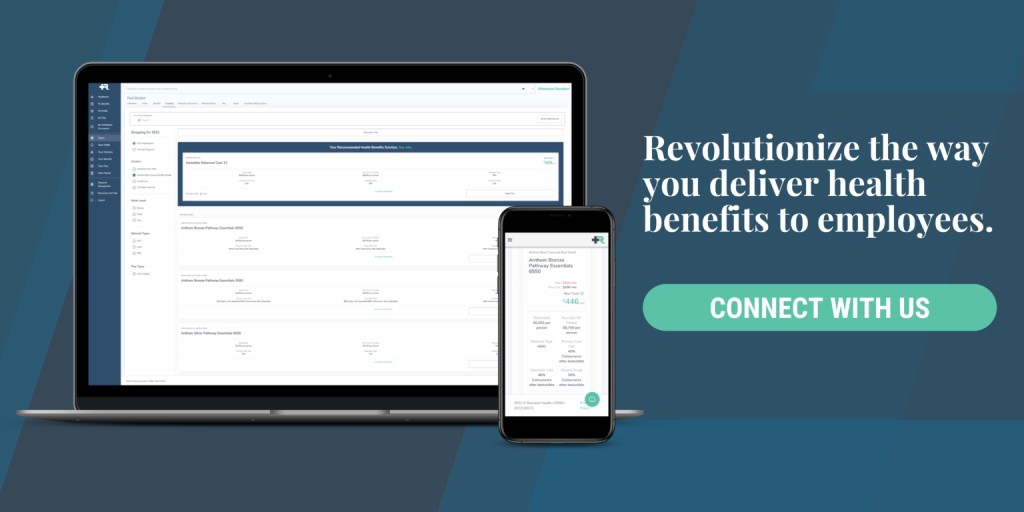
Finding the right health coverage can be challenging for freelancers. Without the safety net of a group health insurance plan, many self-employed individuals face high individual health insurance premiums and limited options for tailored benefits.
How can freelancers manage their healthcare needs while maintaining financial flexibility?
This is where Individual Coverage Health Reimbursement Arrangements (ICHRA) come in. Designed as a flexible alternative, ICHRA allows self-employed individuals to take control of their healthcare by reimbursing costs like premiums and qualified medical expenses. It’s a personalized solution that helps bridge the gap between affordability and comprehensive coverage.
In this blog post, we’ll explore how ICHRA for freelancers works, its key benefits, and how it compares to other options. Whether you’re new to ICHRA or looking to optimize your current health insurance strategy, this resource will help you navigate the process with confidence and ease. Let’s dive into the details!
The Basics of Self-Employed Health Insurance
For self-employed individuals, finding the right health coverage can feel overwhelming. Without an employer-sponsored plan, freelancers and independent contractors must explore individual health insurance options. This often means navigating marketplaces, comparing policies, and managing health insurance premiums out of pocket.
While individual health insurance offers flexibility, it comes with its own set of challenges. The cost of medical expenses can vary widely, leaving many unsure about how to budget effectively.
Challenges Faced by Self-Employed Individuals
- High health insurance premiums that strain personal budgets.
- Limited options for affordable, comprehensive coverage.
- Difficulty predicting and managing out-of-pocket medical expenses.
- Confusion when comparing plans and coverage options on the marketplace.
- Lack of tax-advantaged options for managing healthcare costs.
Understanding these challenges is the first step toward finding better solutions.
Understanding ICHRA
ICHRA provides a unique alternative to traditional health insurance plans. Unlike group plans, ICHRA allows employers to reimburse employees or participants for health insurance premiums and qualified medical expenses. This approach offers flexibility and empowers individuals to choose health insurance benefits that best meet their needs.
ICHRA operates under a robust regulatory framework established by the Internal Revenue Service and the Department of Labor. These regulations ensure that health reimbursement arrangements remain fair and compliant, protecting participants while offering tax advantages. ICHRA reimbursements are tax-free for both employers and recipients, making them an appealing option for managing healthcare costs.
By separating health insurance benefits from a single group plan, ICHRA creates opportunities for self-employed individuals and businesses to personalize coverage. This flexibility can make a significant difference for freelancers looking to balance affordability with quality healthcare options.
Key Features of ICHRA
ICHRA plans allow tailored health insurance solutions. The following features make ICHRA a versatile option for self-employed individuals:
Flexible Health Plan Choices
With ICHRA, participants can purchase health insurance that fits their unique needs. Unlike group health insurance plans, there’s no one-size-fits-all approach. This flexibility ensures individuals can find plans offering the minimum essential coverage that addresses their healthcare priorities.
Defined Contribution Limits
Employers set reimbursement limits, controlling costs while supporting employees’ healthcare. These contributions are tax-free, helping participants manage qualified expenses without financial strain.
Eligibility Requirements
ICHRA plans apply to eligible employees or self-employed individuals. Criteria vary but often include employment type and plan compatibility with Affordable Care Act standards. This ensures fair access while maintaining compliance with health coverage regulations.
How ICHRA Works
ICHRAs are a straightforward yet customizable way to manage healthcare needs. But how does it all come together in practice? Understanding the setup and operational processes is key to making the most of an ICHRA plan.
To start, employers or self-employed individuals define reimbursement limits and establish plan details. This includes determining eligible employees, managing budgets, and adhering to ACA guidelines.
Who funds ICHRA contributions? As a self-employed individual, you determine the reimbursement limits for your ICHRA plan based on your budget. These limits allow you to cover your health insurance premiums or other qualified expenses. Once expenses are incurred, you can track and reimburse yourself using the established guidelines, ensuring tax-free benefits.
Claim and Reimbursement Processes
Managing claims as a self-employed participant is straightforward. You maintain records of qualified expenses, such as invoices for health insurance premiums or medical costs. By verifying and reimbursing yourself according to your set limits, you ensure compliance while keeping your healthcare expenses organized. This streamlined approach supports financial wellness without unnecessary complexity.
Benefits of ICHRA for Self-Employed Individuals
Self-employed individuals often face unique challenges in managing healthcare. ICHRA offers solutions that address these challenges while providing financial flexibility.
Customizable Health Benefits
ICHRA plans adapt to individual needs. Self-employed individuals can prioritize coverage that aligns with their health and financial goals, ensuring optimal benefits without overspending.
Tax Savings Opportunities
ICHRAs provide potential tax credits and deductions. Reimbursements are tax-free for both employers and participants, reducing financial strain and increasing overall savings.
Health and Lifestyle Support
Encouraging healthier choices is a key ICHRA benefit. Access to personalized plans empowers self-employed individuals to focus on preventative care and wellness, enhancing their overall quality of life.
Learn more about how Remodel Health’s ICHRA+® can benefit your business
ICHRA vs. Other Health Insurance Options
Deciding between ICHRA and other options depends on your goals and situation. Here’s how ICHRA stacks up against other choices.
Comparison with QSEHRA
Qualified Small Employer HRAs are another reimbursement option, but they have stricter contribution caps and limited flexibility compared to ICHRA. QSEHRAs are specifically designed for small businesses, whereas ICHRA can be implemented by businesses of any size or even self-employed individuals.
ICHRA vs. Individual Market Plans
ICHRA allows reimbursements for purchased health insurance, offering tax advantages not available with standard market plans. Additionally, ICHRA provides a structured way to manage healthcare expenses, giving participants control over their coverage without sacrificing tax benefits.
Pros and Cons of Each Option
| Feature | ICHRA | QSEHRA | Individual Market Plans |
| Flexibility | High, tailored to needs | Moderate, fixed reimbursement limits | Moderate, limited customization |
| Tax Advantages | Reimbursements are tax-free | Reimbursements are tax-free | Limited or none |
| Administrative Complexity | Moderate, requires setup | Low, simpler to manage | Low, but lacks employer reimbursements |
| Eligibility Criteria | Available to all eligible employees | Limited to small businesses | No restrictions, open to all |
| Employee Choice | Employees choose their plan | Employees choose their plan | Restricted by available plans |
Eligibility and Participation Requirements
What makes someone eligible for ICHRA? Understanding these requirements ensures compliance and access to many benefits.
Eligible employees or self-employed individuals can participate in ICHRA plans. Coverage must meet ACA standards and provide minimum essential coverage.
Participants must also provide proof of health insurance purchase and qualified expenses. Employers must maintain records of plan details, ensuring transparency.
ICHRA enrollment often aligns with open enrollment for individual health insurance plans. Self-employed individuals should establish timelines to coordinate reimbursements seamlessly.
Setting Up an ICHRA
Setting up an ICHRA doesn’t have to be daunting. Here’s how to get started.
Define reimbursement limits, set eligibility criteria, and align the plan with your budget. Ensure compliance with ACA standards for a smooth rollout.
Furthermore, you can use online tools or third-party administrators to simplify the setup process. Remodel Health offers expert guidance and tailored solutions to make setting up an ICHRA simple and effective. With our support, you can confidently manage compliance while focusing on what matters most—your business and the services you render.
Seeking professional help can streamline setup. Advisors help navigate compliance, ensuring your ICHRA plan is optimized and stress-free.
Cost Considerations
Understanding costs is crucial when implementing an ICHRA. Here’s what to expect.
- Average Costs: ICHRA implementation typically involves administrative fees and employer contributions. For self-employed individuals, these costs can vary depending on the level of customization you want.
- Budgeting Tips: Plan for monthly reimbursement limits based on participant needs and financial goals. Setting realistic limits ensures you can manage costs without compromising on the quality of health benefits offered.
Balancing affordability with comprehensive coverage ensures financial stability. Carefully tracking expenses and leveraging tax-free reimbursements can make managing healthcare costs more predictable.
Compliance and Regulations
Adhering to compliance is essential for managing an ICHRA successfully. ICHRA plans are governed by strict IRS regulations.
Employers or self-employed individuals must adhere to reimbursement limits, which are defined annually to ensure fairness and tax compliance. Only qualified expenses, such as health insurance premiums and eligible medical costs, can be reimbursed tax-free. Detailed documentation of each reimbursement is required, including receipts or proof of payment, to validate claims.
Additionally, ICHRA participants must coordinate their plan usage with other tax-advantaged accounts, such as Health Savings Accounts (HSAs), ensuring there is no overlap or misuse of funds.
Failure to comply can lead to penalties. Regular audits and professional advice help maintain legal and financial wellness while using ICHRA effectively. Addressing compliance issues proactively, such as updating plan terms to meet evolving regulations, ensures smooth operation and mitigates potential risks.
ICHRA for Freelancers: A Flexible Health Coverage Solution
ICHRA offers freelancers and self-employed individuals a flexible way to manage health insurance. By allowing reimbursement for health insurance premiums and other qualified expenses, it provides personalized solutions that meet diverse needs. With tax-free reimbursements and control over coverage, ICHRA makes healthcare more accessible and affordable.
Understanding how to set up and manage an ICHRA is key to maximizing its benefits. By following compliance guidelines and tracking expenses, self-employed individuals can ensure their plans remain effective and stress-free. Tools and expert guidance simplify the process, ensuring you focus on your business while maintaining financial wellness.
Are you ready to explore how ICHRA can transform your health insurance?
Remodel Health provides tailored solutions to help you navigate ICHRA plans with confidence. Let us help you create a plan that works for your unique needs.

